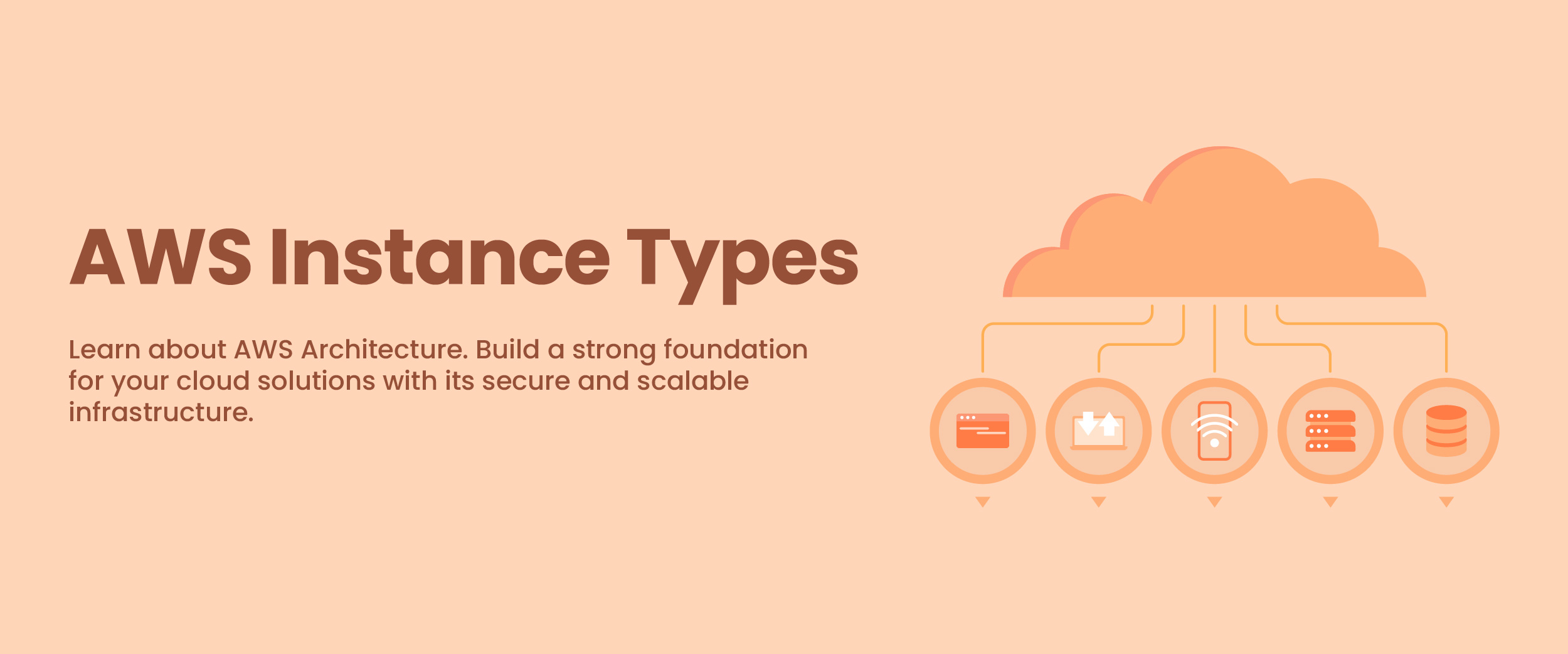AWS Instance Types: General, Compute, Storage, and More
Did you know that AWS has more than 200 services from data centers to offer globally? AWS Instance is a virtual server running on the AWS cloud and one of AWS’s many services. The exclusive features make it a comprehensive cloud. Before discussing its types, it is crucial to have a brief understanding of AWS.
Amazon Web Service (AWS) is a cloud computing platform provided by Amazon. It provides a range of cloud computing services. It offers various AWS instance types that differ based on several terms like network capacity, memory, and storage.
What are AWS Instance Types?
AWS instance types are virtual machine servers available in Amazon Web Services Elastic Compute Cloud (EC2). These instances are of various designs and sizes and perform different functionalities based on the requirement of the specific system. They can either be memory-intensive or compute-intensive.
Each instance type is different by certain specifications. These specifications include CPU, memory, storage, and network capability. They come from various families and have specific functions to perform.
AWS EC2 Instance Types
AWS EC2 instance types exist in various ranges designed to meet the specific needs of the users. They are available to be used in different virtual machine configurations. The following are the most commonly used instances in the AWS instance types list:
General Purpose Instance Types
The general-purpose AWS EC2 instance type suits people new to cloud computing. It is mainly used for game development and web services. It offers a balance of storage, memory, and computing power. The following are the various examples of this instance:
M5 Instances: The M5 instances are suitable for midsized databases as they balance networking resources and compute memory. They also provide features like processing, backend servers, and caching fleets.
T3 Instance: These are used for long-term applications as they support burstable instances. They work well with web applications and make a good choice for less expensive and powerful instances.
Mac1 Instance: The Mac1 instances are suitable for all Apple applications and devices. Apple Mac mini computers power them and help build, develop, and test the devices.
Compute Optimized Instance Types
The compute-optimized instances are an excellent choice for a less expensive instance that works efficiently with compute-intensive workloads. They are mostly used in applications like web servers. The following are two types of compute-optimized instances:
C5 Instance: These instances work suitably for high-performance web servers. They are powered by the Intel Xeon Platinum CPU and are used for media encoding and batch-processing workloads.
C6 Instance: The C6 instance is suitable for advanced applications in gaming servers. It offers a 40% gain in performance and is better than C5 instances in terms of its features and prices.
Memory-Optimized Instance Types
Memory-optimized instances in AWS are required in memory-intensive tasks to process large datasets rapidly. They operate on either Apache Spark or Hadoop and include applications like Big Data Analytics. Following are a few examples of memory-optimized instances:
X1 Instance: The X1 line of memory-optimized instances is designed for high memory and works best for engines that require extensive data processing and in-memory databases. The Intel Xeon CPU powers them.
R5 Instance: The R5 instance is designed for memory-intensive workloads that help with high-performance databases and caching applications. It gives quick access to memory capabilities and computational data. It is powered by Intel and AMD CPUs and benefits from the AWS Nitro system.
R6 Instance: The R6 instances are beneficial for high-performance databases and real-time big data analytics. It is powered by AWS Graviton2 and is suitable for workloads with high memory.
High Memory Instance: The High-memory instances offer high memory and are scalable for large databases. They are operated in large in-memory databases and have plenty of RAM capacity that ranges from 6TB to 24 TB.
Accelerated Computing Instance Types
The accelerated computing instances work best for graphics and parallel processing applications. To provide enhanced performance in applications, they use hardware accelerators. You can learn more about AWS and its instance types by taking a comprehensive AWS course.
The following are a few of the different types of accelerated computing instances in AWS:
F1 Instance: F1 instances enable the FPGA-based hardware acceleration to boost the networking functionality. The high-frequency Intel Xeon CPU powers it and allows you to customize FPGA AMIs to accelerate application development and working.
Inf1 Instance: The Inf1 instances in AWS instance types provide minimal latency to the applications and give an affordable performance. They feature 16 AWS inferential machine learning chips and are powered by 2nd generation processors of Intel Xeon.
G3 Instance: The G3 instances offer inexpensive yet excellent performance solutions for graphic-intensive applications. They are powered by high-frequency processors of Intel Xeon and designed with NVIDIA Tesla M60 GPU. They help big time with tasks that are graphics-related, like streaming.
P2 Instance: P2 instances are designed for computing workloads of GPU. They exclusively provide high-performance networking and work efficiently for deep learning applications.
Storage Optimized Instance Types
Storage-optimized instances are designed to provide high minimal latency and random input/output operations. They work well for applications that are cloud-running and have high transaction workloads. They are mostly used for applications with high storage requirements. The following are the details of different storage-optimized instances:
D2 Instance: The D2 instances are storage-optimized as they also have high read and write rates for large datasets. They are used for data warehousing and log processing. These instances are offered at low prices on Amazon EC2.
H1 Instance: The H1 instances are used for data-intensive applications as they have small storage availability. They provide elevated networking and high disk performance and are powered by an Intel Xeon CPU.
I3 Instance: The l3 instance works well with relational databases and in-memory caching of databases. They provide high IOPS and SSD storage with minimal latency. They also offer an economical price and give outstanding input/output performance.
Conclusion
AWS instance types make the functions in AWS work with scalability and meet the requirements of organizations and industries of all kinds. AWS offers various instance types with unique functionality for different purposes. You can select any instance according to the need of your system.






